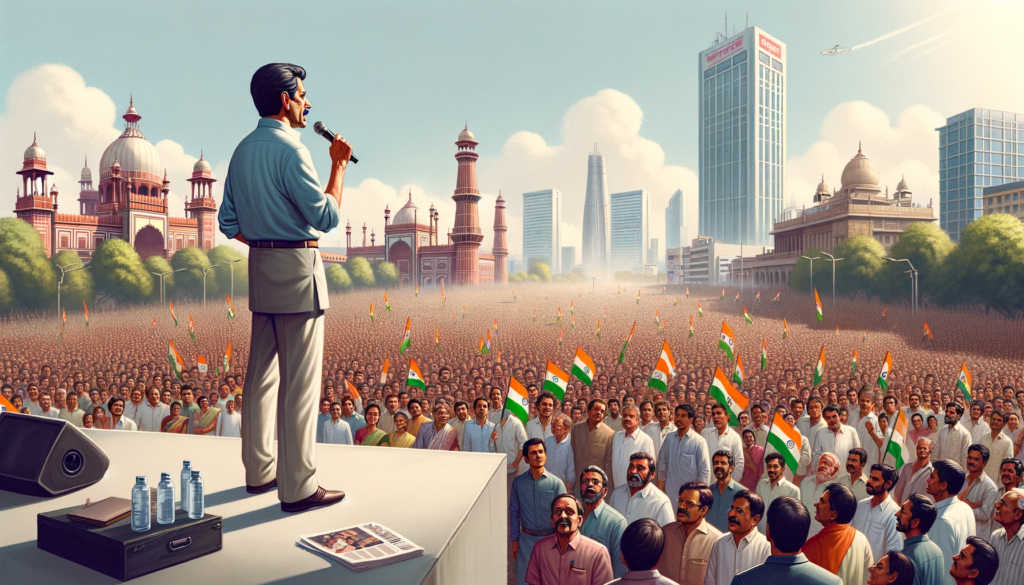
In India’s complex political arena, strategists have become key figures, guiding the success of parties and candidates. With their keen analytical skills and strategic vision, they are instrumental in aligning campaign efforts with the evolving preferences of the electorate. As traditional campaign strategies lose efficacy in the digital age, strategists bring invaluable expertise in leveraging data, social media, and targeted outreach to reach voters. They play a crucial role in crafting messages that resonate deeply, helping politicians connect more authentically with diverse voter bases across the country.
Evolution of Political Strategists in India
The role of political strategists in India has evolved significantly since 2014 Indian general elections. This period marked a shift towards more sophisticated campaigning as new media and technology began to influence the political landscape. Previously, campaigns were primarily driven by mass rallies and charismatic leaders, but the emergence of data-driven strategies transformed this approach. Today, strategists with backgrounds in marketing, communications, and data analytics bring a fresh perspective, utilizing insights and digital tools to create impactful campaigns. This evolution reflects a broader shift in Indian politics towards more targeted and personalized voter engagement.
Role of Political Strategists in Election Campaigns
Strategists are pivotal in developing and executing election campaigns. They start by conducting thorough research to gauge the electorate’s sentiments, preferences, and concerns. This data informs the creation of targeted messages and narratives that appeal to specific voter segments. Political strategists also manage various campaign aspects, from designing digital content to orchestrating rallies. Their work ensures that every campaign component is aligned and optimized for maximum impact. By coordinating efforts across different platforms, they amplify candidates’ messages and build momentum, which is essential for gaining public support.
Famous Political Strategists in India
In India, several political strategists have gained prominence for their successful campaign contributions. Prashant Kishor, a well-known figure, has worked on campaigns for leaders like Narendra Modi and Mamata Banerjee. His innovative strategies and data-driven approach have been game-changers, significantly impacting election outcomes. Similarly, Sunil Kanugolu, known for his expertise in digital campaigning and social media analytics, has helped shape narratives for parties like the Congress and ADMK. These strategists exemplify the growing importance of data analysis and digital savvy in Indian politics, setting new benchmarks for campaign management.
Other notable strategists bring unique skills to the table. Amitabh Tiwari blends policy analysis with grassroots strategies, providing insights across various campaigns. Rajat Sethi, focusing on the BJP affairs in Northeast, brings a deep understanding of regional dynamics that influence local political messaging. Atul Malikram specializes in media relations, managing public perception and enhancing communication for political parties. Robin Sharma, known for his work in Andhra Pradesh, emphasizes ground-level mobilization, while Kalyan Chandra uses digital marketing and analytics to build strong online presences for candidates. Together, these consultants demonstrate the diverse approaches and expertise that shape modern Indian political campaigns.
Impact of Political Strategists on Election Outcomes
Political strategists have proven influential in swaying election results. Their strategic insights have played a decisive role in key victories, such as the BJP’s success in the 2014 general elections, where Prashant Kishor’s strategies were crucial. His understanding of voter demographics and his digital outreach initiatives helped position Narendra Modi effectively on a national scale. Similarly, in the 2015 Bihar elections, Kishor’s strategies helped the Janata Dal (United) coalition secure a win against the BJP-led alliance. The success of these campaigns highlights the powerful role strategists play in shaping electoral outcomes by influencing voter perception and engagement.
Challenges Faced by Political Strategists in India
Political strategists in India operate in a challenging environment marked by volatility and unpredictability. They must navigate a landscape defined by diverse voter demographics, fluctuating political alliances, and complex social dynamics. Additionally, the increasing use of divisive tactics, such as inflammatory rhetoric, complicates their work, as they must maintain the integrity of their clients’ campaigns while addressing sensitive issues. Furthermore, India’s evolving regulatory environment around campaign finance and media access demands that strategists stay well-informed to ensure compliance and avoid legal complications. The proliferation of misinformation adds another layer of complexity, requiring strategists to develop countermeasures that safeguard their clients’ reputations.
Future Prospects for Political Strategists in Indian Politics
The demand for political strategists in India is set to rise as digital transformation continues to reshape the political landscape. With the growing importance of data-driven decision-making, strategists who excel in data analytics, social media engagement, and digital communication will be indispensable. India’s diverse and complex voter base presents a unique set of challenges, but skilled strategists who can decode regional dynamics and anticipate trends will be well-positioned to help parties and candidates succeed. As the Indian political ecosystem becomes more intricate, the role of these strategists in shaping electoral strategies and outcomes will only expand.
The Role of Technology in Political Strategy
Technology is a cornerstone of modern political strategy. Political strategists use data analytics to gain insights into voter behavior, enabling them to develop highly targeted campaigns. Social media platforms allow them to engage with voters directly, particularly younger audiences who are highly active online. AI and machine learning offer further capabilities, such as predictive modeling and personalized messaging, which enhance campaign effectiveness. While these tools increase efficiency, they also bring challenges around privacy, data security, and the risk of misinformation. Political strategists must balance these considerations to use technology ethically and responsibly.
Conclusion: The Changing Landscape of Indian Politics with the Rise of Political Strategists
The rise of political strategists has transformed Indian politics, introducing data-driven, technology-enabled approaches that enhance campaign success. These strategists are key players, driving campaign innovation and shaping public discourse. Their expertise has been instrumental in major electoral victories, as seen in the BJP’s 2014 win and the 2015 Bihar coalition’s success. Yet, as these strategists navigate challenges like misinformation and regulatory complexities, their ability to adapt and innovate will be crucial. As India approaches future elections, the role of political strategists will continue to grow, influencing not only electoral outcomes but also the broader democratic process.

Kalyan Chandra
Kalyan chandra is a political strategist, media and communication consultant with the expertise in public relations, marketing, political research, election campaign management, psephology and digital analytics. He focuses on strategic political consulting, offering services that include competitive research, public opinion collection, and digital media management. Kalyan has significantly contributed to successful campaigns across India with his meticulous approach and deep understanding of the political landscape.
Related posts:
- Congress Party Manifesto – Telangana 2018 Assembly Elections (Text)
- Hindu Nationalism in India – Key Proponents
- Can actor Vijay’s Political Entry (TVK) Reshape Tamil Nadu politics ? Challenges and Opportunities on the Road to Chief Ministership
- Emerging Trends & Technologies : Indian Political Campaigns
- perfect service page
- Supreme Court Verdict Paves the Way for Rahul Gandhi’s Reinstatement as Lok Sabha MP
